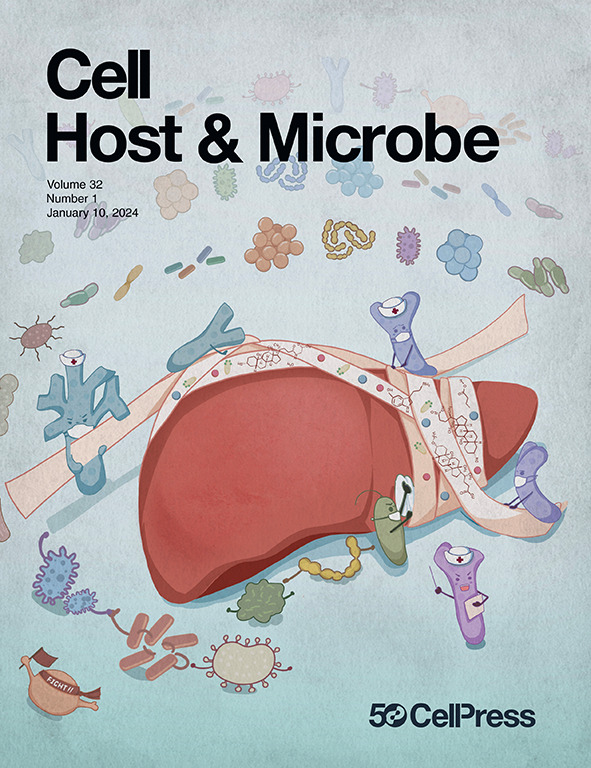Age-related impairment of intestinal inflammation resolution through an eicosanoid-immune-microbiota axis
IF 18.7
1区 医学
Q1 MICROBIOLOGY
引用次数: 0
Abstract
Aging manifests a decline of immune function, induces microbiome dysbiosis, drives organ inflammation, and impedes the resolution of inflammation. However, the mechanisms underlying age-related intestinal inflammation remain poorly described. Here, we find that the resolution of T cell-initiated intestinal inflammation is impaired with aging. This impairment is mediated by disrupting the immune-microbiota interplay, controlled by intestinal eicosanoid metabolism. Pharmacologically inhibiting eicosanoid biosynthesis, blocking the prostaglandin E receptor subtype 4 (EP4), or genetically ablating EP4 diminishes age-related impairment of intestinal inflammation resolution. Mechanistically, mononuclear phagocyte-intrinsic eicosanoid-EP4 signaling impedes the resolution of intestinal inflammation through fostering gut microbial dysbiosis and, more importantly, interrupting segmented filamentous bacterial adhesion to the intestinal epithelium. Colonization with EP4-ablated mouse microbiota or segmented filamentous bacteria improves the resolution of intestinal inflammation. These findings reveal that eicosanoid-dependent immune-microbiota interactions impair inflammation resolution in the aged intestine, highlighting potential intervention strategies for improving age-related gut health.

通过二十烷类细胞-免疫-微生物群轴的肠道炎症解决的年龄相关损伤
衰老表现为免疫功能下降,引起微生物群失调,引发器官炎症,阻碍炎症的消退。然而,与年龄相关的肠道炎症的机制仍然缺乏描述。在这里,我们发现T细胞引发的肠道炎症的消退随着年龄的增长而受损。这种损伤是通过破坏肠道类二十烷代谢控制的免疫-微生物群相互作用介导的。药理学上抑制类二十烷酸生物合成,阻断前列腺素E受体亚型4 (EP4),或基因上消融EP4可减少与年龄相关的肠道炎症消退损伤。从机制上讲,单核吞噬细胞固有的二十蛋白类ep4信号通过促进肠道微生物生态失调,更重要的是,阻断分节丝状细菌对肠上皮的粘附,从而阻碍肠道炎症的解决。用ep4消融的小鼠微生物群或分节丝状细菌定殖可改善肠道炎症的消退。这些研究结果表明,类二十烷酸依赖的免疫微生物群相互作用损害了衰老肠道的炎症消退,强调了改善与年龄相关的肠道健康的潜在干预策略。
本文章由计算机程序翻译,如有差异,请以英文原文为准。
求助全文
约1分钟内获得全文
求助全文
来源期刊

Cell host & microbe
生物-微生物学
CiteScore
45.10
自引率
1.70%
发文量
201
审稿时长
4-8 weeks
期刊介绍:
Cell Host & Microbe is a scientific journal that was launched in March 2007. The journal aims to provide a platform for scientists to exchange ideas and concepts related to the study of microbes and their interaction with host organisms at a molecular, cellular, and immune level. It publishes novel findings on a wide range of microorganisms including bacteria, fungi, parasites, and viruses. The journal focuses on the interface between the microbe and its host, whether the host is a vertebrate, invertebrate, or plant, and whether the microbe is pathogenic, non-pathogenic, or commensal. The integrated study of microbes and their interactions with each other, their host, and the cellular environment they inhabit is a unifying theme of the journal. The published work in Cell Host & Microbe is expected to be of exceptional significance within its field and also of interest to researchers in other areas. In addition to primary research articles, the journal features expert analysis, commentary, and reviews on current topics of interest in the field.
 求助内容:
求助内容: 应助结果提醒方式:
应助结果提醒方式:


